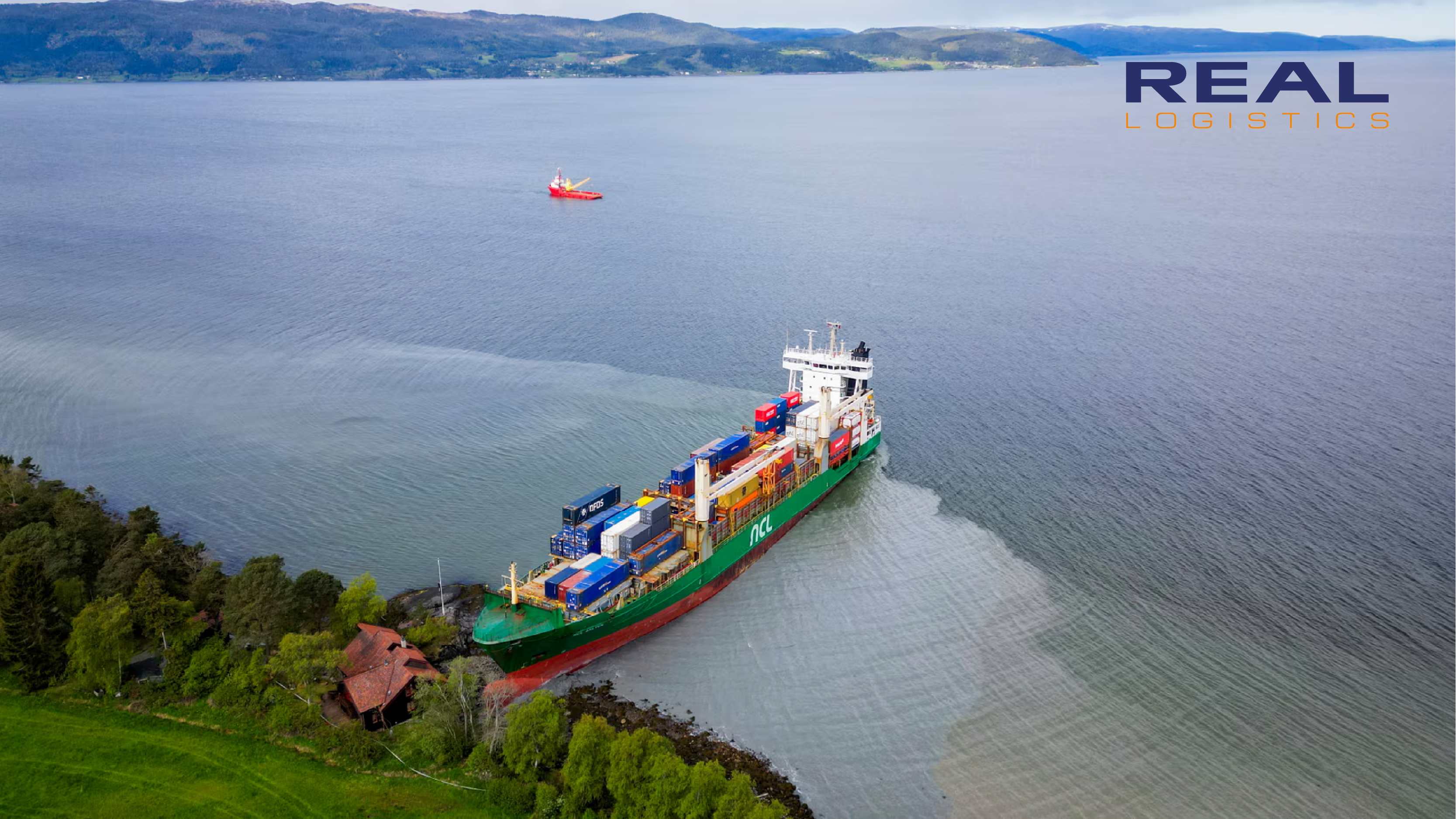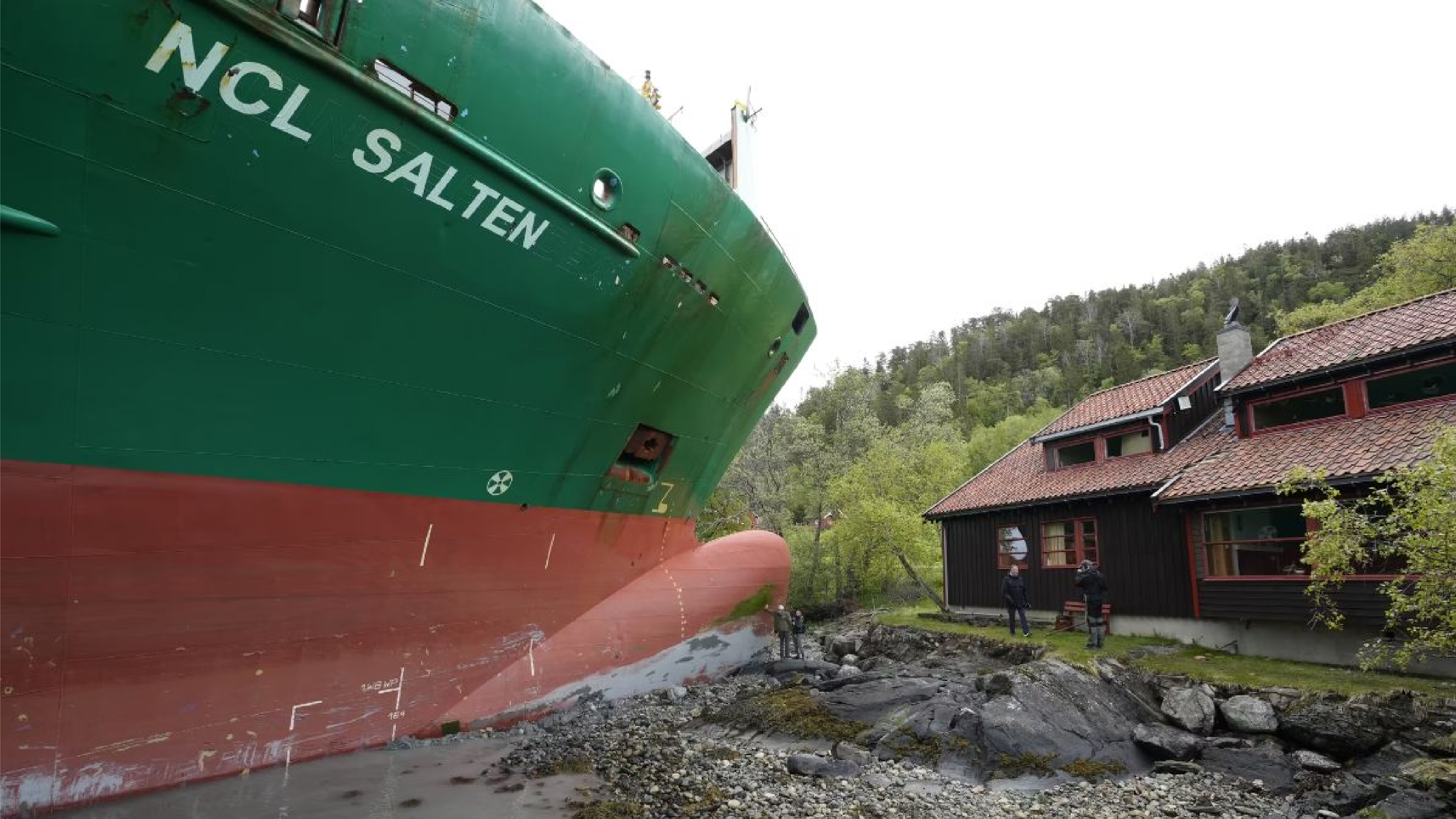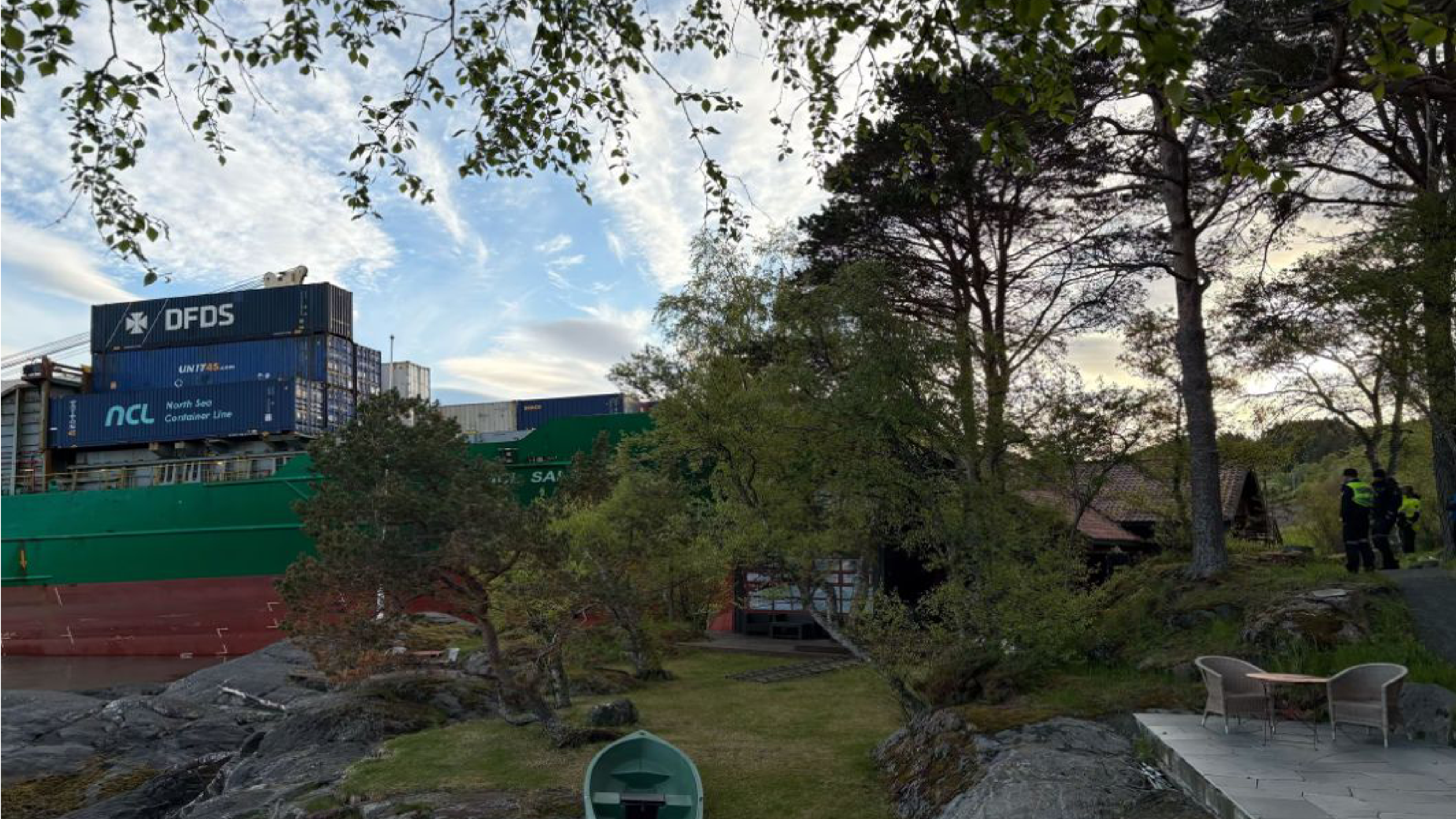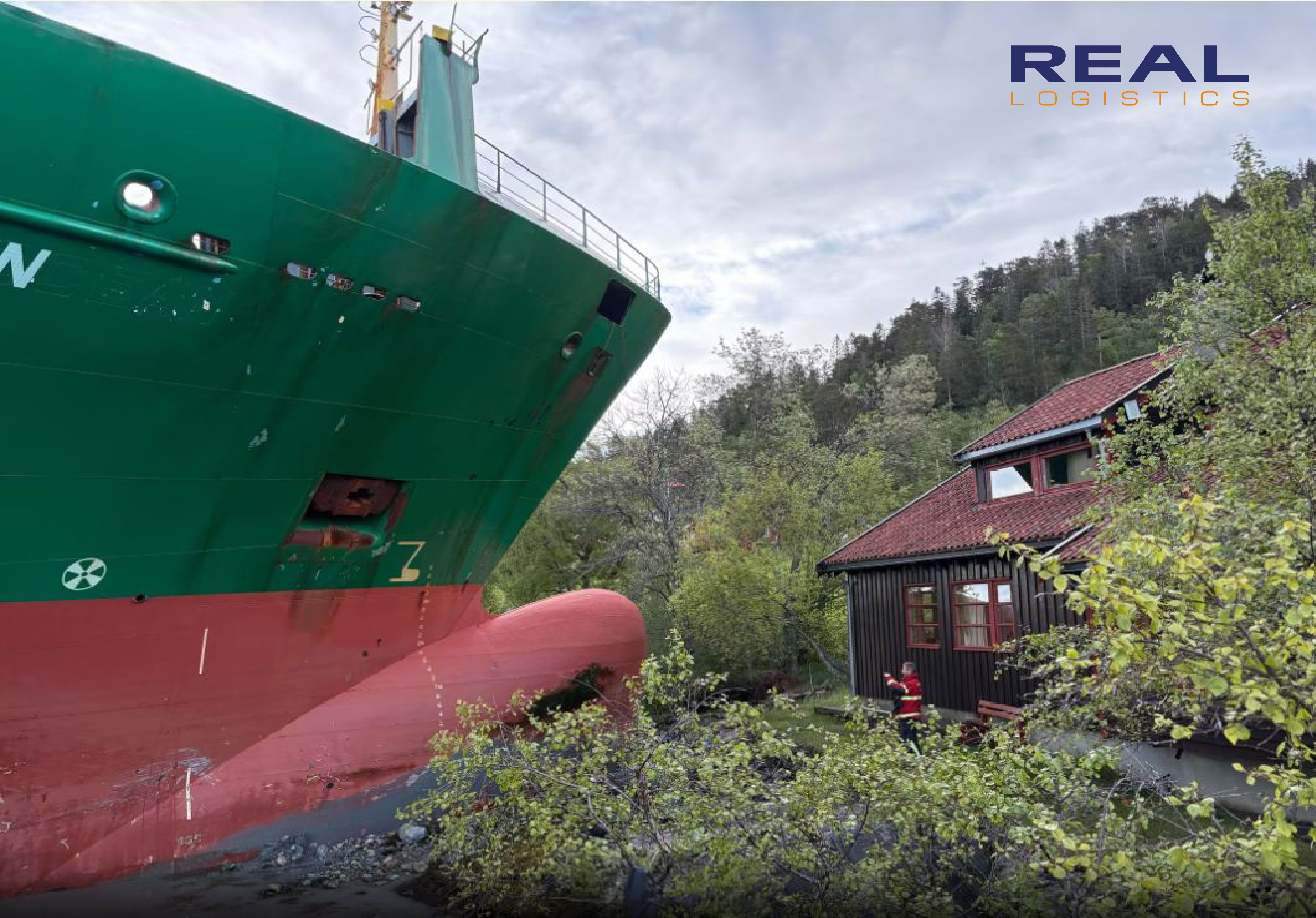Container Ship Grounding in Norway's Garden: A Wake-Up Call for Maritime Safety
Summary: The grounding of the 135-meter container ship NCL SALTEN dangerously close to residential areas in Byneset, Trondheim, Norway, serves as an important lesson in maritime safety and risk management in international shipping. This event highlights challenges in ship navigation, human factors, and the critical roles of backup technology and strict maintenance processes.
1. Incident Details: Ship Grounded Near Residential Homes in Trondheim
Recently, the container ship NCL SALTEN, measuring 135 meters in length and nearly 10,000 tons in weight, operated by North Sea Container Line (NCL), ran aground perilously close to the residential area of Byneset in Trondheim, Norway, just 7 meters from homes. The ship’s bow penetrated the backyard of a local residence, while its hull blocked a narrow channel, causing significant congestion for surrounding vessels.
Although flagged under Cyprus with a crew of 16, fortunately, there were no reported injuries or fuel leaks. The incident shocked the community and disrupted local waterways. Images of residents watching the massive ship stuck in front of their homes quickly spread across international media, marking it as one of the most unusual and serious local incidents in recent years in Norway.
Experts suggest preliminary causes may relate to navigation errors while maneuvering through a narrow coastal area, changing weather conditions, or temporary technical issues with the steering system. Emergency rescue operations were promptly coordinated by the Trondheim port authority, which secured the area to ensure safety for the community and other vessels around.

According to The Guardian and BBC, homeowner Johan Helberg said he was “astonished” when he looked out his window at 5 a.m. and saw a massive green vessel looming in his front yard:
“I had to bend my neck to see the top. It was so unreal.”
The ship stopped just five meters from crashing into his bedroom.
His neighbor, awakened by the noise, rushed to warn him:
“We thought it would crash directly into the house. It was terrifying—but thankfully, no one was hurt,” said Bard Jorgensen, whose father screamed when he saw the ship approaching.

2. Incident History: Concerning Past Events of NCL SALTEN
The NCL SALTEN has gained notoriety due to a series of serious incidents within less than three years, including:
- 2023 – Grounding at Hadsel: Ran aground in a coastal area of Northern Norway, affecting local trade activities.
- 2023 – Loss of Control Off Stavanger: Experienced a temporary technical failure causing brief loss of control, no collisions occurred.
- 2024 – Grounding at Ålesund: Third grounding near a major Western Norway port, severely impacting shipping schedules.
- 2025 – Grounding at Trondheim: Incident near residential areas raised public concerns about operational safety.
This series of incidents has impacted NCL’s reputation and raised serious questions about the ship’s maintenance, crew training, and navigation system operations. Preliminary reports indicate the second officer fell asleep while alone on duty.

3. In-Depth Analysis from a Logistics and Maritime Perspective
3.1. Role of Navigation Systems and Risks from Human Error
Modern navigation systems such as Electronic Chart Display and Information System (ECDIS), Automatic Identification System (AIS), and integrated radar are recognized technical standards to minimize grounding and collision risks. However, repeated incidents involving NCL SALTEN suggest critical gaps in:
- System Redundancy: Lack of backup systems or early warning if primary navigation systems fail.
- Crew Training: Insufficient preparedness for adverse weather, rapid changes, or narrow waterway navigation.
- Operational Management: Limited monitoring and response to alerts from onboard equipment.
In modern maritime transport, integrating human expertise with technology is vital, especially in congested or complex coastal waters like Norway’s.

3.2. Supply Chain Impacts and Risk Costs
The grounding is more than a technical failure; it triggers direct logistics and supply chain ramifications:
- Delivery Delays: Vessel congestion or rescue delays disrupt schedules, leading to increased demurrage fees.
- Higher Shipping Costs: Incident management, including towage and repairs, raises operating expenses.
- Loss of Partner Trust: Trade partners may question operational reliability, affecting long-term cooperation.
- Cargo Damage Risks: Physical incidents can damage sensitive or high-value goods.
Thus, evaluating operational capacity, safety history, and transparency of shipping lines is paramount for logistics decision-making.
3.3. Environmental and Community Safety Concerns
Groundings near residential zones raise significant environmental and public safety issues. Potential fuel or chemical leaks pose pollution risks to water and soil. Consequently, clear preventive and emergency response protocols are essential, alongside rigorous training and enforcement.

4. Lessons Learned and Recommendations for the Maritime Industry
The NCL SALTEN incident underscores the need for:
- Full documentation of Protection & Indemnity (P&I) insurance and safety certifications before contracts are signed.
- Partnering with forwarders capable of providing transparent vessel history checks, AIS data, and rapid risk alerts.
- Proactive contingency planning for high-value cargo and critical shipping routes.
- Enhanced crew training emphasizing operational safety and effective use of navigation technology.
5. Recommendations from Real Logistics
With extensive experience in maritime transport and supply chain management, Real Logistics recommends:
- Selecting shipping lines based on clear safety records and incident history.
- Implementing real-time tracking technologies to monitor shipping status.
- Utilizing expert consultation services for vessel and route inspections leveraging multidimensional data.
- Cooperating among stakeholders to establish rapid incident response protocols to prevent supply chain disruption.
6. Conclusion
The grounding of NCL SALTEN near residential areas in Trondheim is a significant event highlighting critical challenges in operational safety and logistics risk management globally. In today’s highly interconnected supply chains, any weak link can trigger costly domino effects if not rigorously managed and prepared for. Businesses must be proactive, leverage technology, and optimize risk management to ensure safe and continuous cross-border shipping operations.
—————————————
Real Logistics Co.,Ltd
👉 Facebook: Real Logistics Co.,Ltd
☎️ Hotline: 028.3636.3888 | 0936.386.352
📩 Email: info@reallogistics.vn | han@reallogistics.vn
🏡 Address: 39 - 41 B4, An Loi Dong, Thu Duc, HCM City
51 Quan Nhan, Nhan Chinh, Thanh Xuan, Ha Noi City

